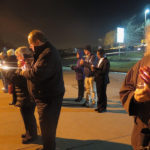By Corrine Winter
In a week, we will begin the season of Lent, a season of reflection, repentance and conversion. Somehow, this year, we seem to have a particular need to engage in all of those activities not only as individuals but as community. As we hear the news (or perhaps try to avoid it for a time), we can’t help wondering about the sources of the many wounds from which the world is suffering. We can’t help wondering what, if anything we can and should do. One temptation may be to despair, to give up on ourselves and on one another and begin to ask God for some dramatic intervention that does not fit the way God works within our history.

Asking God to sweep in and make the changes we want but don’t believe we can accomplish reduces God to a granter of wishes. It reduces faith to believing that in the end things will go our way. And it reduces us to an unhealthy demanding dependency. Throughout Scripture, we find stories of God sending people to speak God’s word, and to accomplish God’s work. Sometimes, those who are called even object to the calling on the basis of their weaknesses: Moses says that he stutters, Jeremiah says he is too young, Isaiah objects that he is a man of unclean lips. Even Jesus is said to have asked the Father to “let the cup pass.” But Jesus immediately adds that he wills what the Father wills. He meets his accusers head on. He takes up the cross. It may sound almost trite to say that during Lent we must strive to make our own that second part of Jesus’ prayer and to take up the cross.
What does the cross look like during Lent, 2017? We can name some of its colors. It includes the fears experienced by refugees who find so many doors closed to them, who after leaving everything to escape starvation, war and persecution find themselves still victims of others’ fears. It includes the frustrations of those who believe their voices are not heard by those in power, who may be tempted to turn to violence in order to get the attention of the world. It includes the pain of those who are exploited by others economically, physically, socially or in any other way. I can’t and don’t need to write out an exhaustive list. The point is that we are called as Christians to accept these burdens as belonging to us.
In being tempted to turn away, it seems to me that we are in good company. I read the Gospel accounts as showing Jesus’ closest disciples several times being tempted to reject his message as too difficult. It became too difficult especially when Jesus was arrested and put to death. The experiences of the resurrection and of the continuing presence and power of the Holy Spirit revived and sustained their faith, their determination and their own work to continue the work of Christ. We too have certain knowledge of the resurrection and of the Holy Spirit present and at work among us. That doesn’t mean the work will be easy, but that we can and must persevere with or without clear evidence that our efforts are bearing fruit.
In our determination and our faith we must support one another in community. We must hold one another accountable to the principles we claim to hold. We must engage in communal discernment, remaining open to the Spirit. There is no magic wand, no “deus ex machine” who will suddenly appear with all the answers. We must be committed to the struggle. That is the conversion to which Pope Francis is urging us to aspire as he gives a series of talks on Christian hope in preparation for Lent.
(Corinne Winter is a professor of theology at St. Ambrose University in Davenport.)











